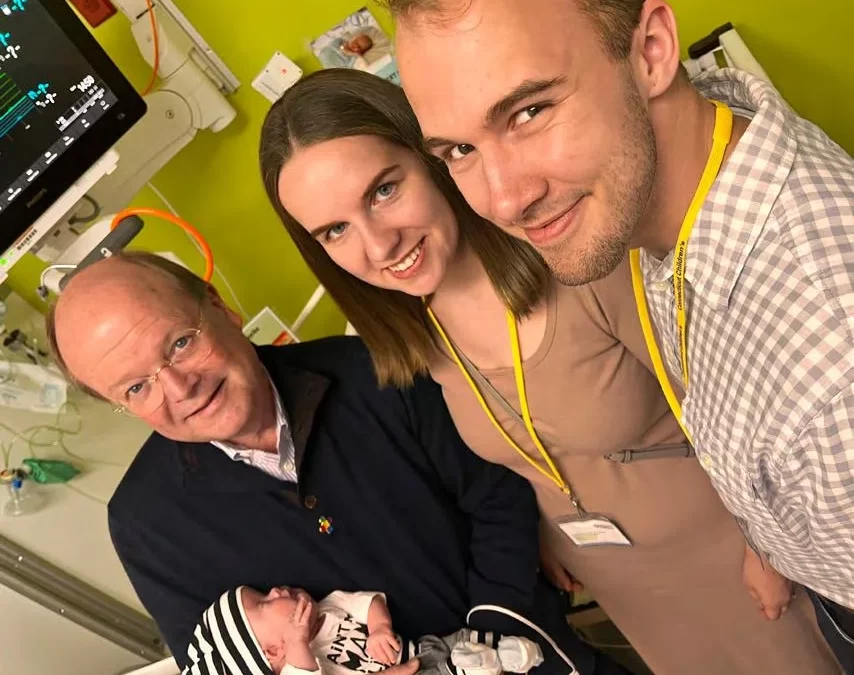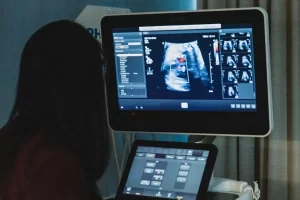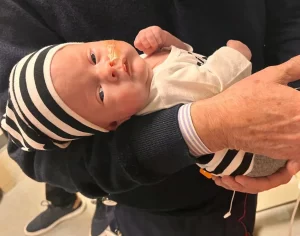Timothy Crombleholme, MD, is a world-renowned expert in fetal surgery. He and his experienced team diagnose and treat the full spectrum of complex fetal conditions, some of which require surgery during pregnancy.
1. Dr. Crombleholme, you are a seasoned expert in the world of fetal care. Please tell us a bit about yourself!
I’m a pediatric and fetal surgeon and I have devoted my career to fixing serious conditions that start in the womb. When I was in medical school, I read a case report in the New England Journal of Medicine reporting the very first open fetal surgery performed by Michael Harrison, MD, the, “Father of Fetal Surgery,” in April of 1981. I was fortunate to train at the University of California San Francisco (UCSF) with Dr. Harrison during the dawn a new era when fetal surgery was first emerging—and became fascinated with the idea that the uterus did not have to be a barrier to solving problems in a developing baby.
Too often, a baby with a problem develops irreversible consequences by the time of delivery that could have been addressed in utero. The goal of fetal surgery is to intervene at a time that will allow more normal development to occur and prevent these consequences.
2. What drew you to Connecticut Children’s? Why open a fetal care center in Hartford, CT?
First, Connecticut Children’s offers excellent subspecialty care not only in fetal surgery, but in maternal fetal medicine support, neonatology, pediatric radiology, genetics, and multiple pediatric surgical subspecialties. These are all required to provide comprehensive prenatal evaluation and postnatal care for expectant moms with high-risk pregnancies.
We work in an integrated fashion to provide supportive care for both mom and baby while addressing among the most challenging of fetal problems. All of these components are built into the Fetal Care Center at Connecticut Children’s.
Second is our institutional commitment to expanding and innovating. This can be seen in the building of a new patient tower at Connecticut Children’s, the third floor of which will be dedicated to the Fetal Care Center once construction is complete in 2025.
Finally, we are grateful to have all the required components to build a full-fledged, comprehensive fetal care center; we recognize that not every tertiary or quaternary children’s hospital has this opportunity.
3. Why is it sometimes better to operate on a baby before it is born?
Babies are the most vulnerable of patients and the reality is many of the unborn babies I treat are diagnosed with life-threatening conditions—while still developing in the womb. By the time they are born, care and treatment become extremely difficult, if at all possible. Often, there can be ongoing organ injury or developmental abnormalities which are no longer fixable.
We want families to have the best possible outcomes and their babies to lead healthy, fulfilling lives. When you operate on a baby in the womb, you’re changing the course of the condition. We no longer see the uterus as a barrier to treating the unborn patient, but rather the world’s best incubator that allows the baby to heal and develop more normally once they have been treated.
4. How do you work with families who are facing the uncertainty that comes with a high-risk pregnancy?
Everyone involved in the Fetal Care Center appreciates how stressful being diagnosed with a fetal anomaly can be. We aim to help families understand the condition, what effect it can have on the baby’s development and treatment options either before or after birth. Often, this approach provides the family comfort and a sense of control in an otherwise frightening situation.
Before any surgery or intervention, we sit down with the parents and explain what their baby is facing, the risks, and the options for the paths forward for the most positive outcome possible—from pregnancy through delivery, and beyond.
Families need and deserve the care and support a place like Connecticut Children’s offers, and we’re pleased to meet those needs the best we can.
5. What makes the Fetal Care Center at Connecticut Children’s different than other fetal care centers across the nation?
Something unique offered at the Fetal Care Center at Connecticut Children’s is a comprehensive, customized, integrated one-day evaluation with a full panel of experts—all at one location. My colleagues and I want to make the experience as easy as possible to help families fully understand their baby’s condition and having all of their questions addressed.
Additionally, moms who need fetal surgery can expect the expertise of a team who only focuses on fetal and neonatal surgery. We call this vertically integrated care: from the time of prenatal diagnosis, throughout pregnancy, at the delivery, through the NICU course and long-term follow up, the same team continues to care for you and your baby. I truly believe this team approach leads to better outcomes.
“When you operate on a baby in the womb, you’re changing the course of the condition. We no longer see the uterus as a barrier…”
6. What do you envision for the future of fetal care?
I believe that we will see continued expansion of the indications for fetal intervention with new approaches to curing genetic conditions before birth with fetal cellular therapy and fetal gene therapy. We are currently working on placental gene therapy to treat severe fetal growth restriction, or intrauterine growth restriction (IUGR), a leading cause of perinatal morbidity and mortality.
7. What’s the most rewarding part of your job?
I often hear from parents and their kids who are now going off to college—and whom I operated on 20 years ago. It’s rewarding to see these lives blossom when life might not have been possible. The greatest satisfaction of my career is the privilege of having touched the lives of these families.
The Center
The Fetal Care Center at Connecticut Children’s is on a mission to potentially intervene and alter the course of a baby’s condition by shifting the focus from when the baby is born, to as early as 15 or 16 weeks in development. It is one of only a few, true comprehensive centers in the Northeast, offering a full spectrum of care for unborn babies diagnosed with fetal abnormalities such as twin-twin transfusion syndrome (TTTS), myelomeningocele (MMC), and congenital diaphragmatic hernia (CDH). Among our groundbreaking procedures is the FETO technique, designed to advance lung growth to treat the most severe cases of CDH. It is at the forefront of cutting-edge technology and open and minimally invasive fetal interventions for the most complex fetal conditions.
To refer a patient, please call 1-833-733-7669. To request an appointment without a referral, please call 1-860-545-9830.
Dr. Timothy Crombleholme reuniting with baby Thaddeus, and his parents, Ester and Samuel, after undergoing successful open fetal surgery for the treatment of myelomeningocele, the most serious type of spina bifida.



